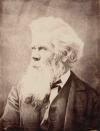Biography
Henry Parkes was born to a family of yeoman stock in Warwickshire, England in 1815. Unfortunately, falling wheat prices forced the family to leave the land and seek employment in Birmingham. In 1836 Parkes married Clarinda Varney and they applied for assisted passage to Australia, the death of two of their infant children and a failed business venture influencing their decision.
Arriving in Australia, he found work as a farm labourer, but low wages did not appeal! Renewing his old interest in politics, he went to work for the Customs Department in Sydney. Over the next few years he went into business for himself and at one stage owned the Empire newspaper. Through this period be became very influential and played a major role in the cessation of transportation of convicts to Australia. Going bankrupt he retired from the political arena, narrowly escaping fraud charges as his debts exceeded 48 500 pounds (approx. $100 000). He turned to his old friends and with their support was re-elected, becoming a strong supporter of land and educational reform, free trade and immigration. It needs to be pointed out that politicians were not pad for their role in this era of time in Australia.
All this time, Parkes left his wife and five children at Werrington (near Penrith). Mrs Parkes was often short of money and constantly besieged by creditors. The property was managed by an insolent and disobedient man and the property went down hill. She indicated her loneliness in a letter to her husband after the birth of their sixth child when she wrote, "I have received no congratulations". Parkes had ventured upon another business and once more shown his lack of acumen by going bankrupt again, this time losing his property lease.
Parkes introduced the Public Schools Act in 1866, giving power to train, appoint and dismiss teachers, the Hospital Act providing Government inspection, supervision and appointment of trained nurses to Hospitals. He was forced to resign because of insolvency. In 1871 he returned as the Member for Mudgee and so began the golden age of his political career. He was an able speaker, somewhat of an actor and his long white hair and flowing beard gave him an apostolic look. Parkes believed the voters should feel that you are the "Man of the Hour". During this period, he introduced the Public Instruction Act which abolished state aid for denominational schools (as a result NSW has been plagued by a two school system ever since).
Parkes' Ministry is best remembered for his fiery and impassioned support for the Federation of Australian Colonies, making his famous speech at the School of Arts, Tenterfield on 24 October 1889.
Parkes faced personal tragedy and more criticism after marrying Eleanor Dixon about a year (6 Feb 1889) after the death of Clarinda (2 Feb 1888). This marriage was never recognised by his family. Eleanor died in 1895, leaving Parkes with young children and in a declining mental and physical health. He then married Julia Lynch who nursed the old warrior until his death on 27 April 1896 at the age of 80 years and 11 months.
Sir Henry was a typical of a wide range of 19th century politicians, but his very special ability to appreciate the importance of the action he was taking and his vision of a strong and united Australia certainly made the people believe that he was, indeed, "THE MAN OF THE HOUR". ..






